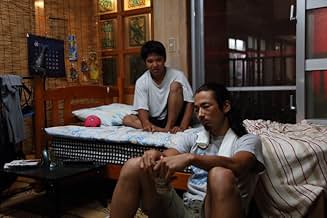Ikari
- 2016
- 2h 22min
VALUTAZIONE IMDb
7,0/10
3574
LA TUA VALUTAZIONE
Aggiungi una trama nella tua linguaA grisly unsolved murder links three seemingly unrelated stories in three different Japanese cities.A grisly unsolved murder links three seemingly unrelated stories in three different Japanese cities.A grisly unsolved murder links three seemingly unrelated stories in three different Japanese cities.
- Premi
- 4 vittorie e 21 candidature totali
Recensioni in evidenza
This Japanese mystery/drama is made up of three concurrent stories centring on enigmatic strangers who enter the orbits of trusting individuals from different Japanese cities, while a grim double-murder investigation plays out in the background. In Chiba, an ex sex worker forms a relationship with a taciturn young man whom her father is wary of, a confident gay man begins a relationship with a quiet and mysterious man he met in a seedy joint in downtown Tokyo and a young lady newly arrived in Okinawa befriends a drifter who lives alone on a nearby island.
I must say that I found this film to be pretty riveting from start to finish. The detective strand of the story takes a bit of a back-seat while the three main plot strands propel forwards. But the whodunit aspect remains extremely compelling and I was gripped to the end. The various stories all play off feelings of trust/mistrust in regard to how the trio of strangers are perceived and treated by the people they come into contact with. The acting by the ensemble cast is very strong throughout and the different dramas all have a strong dramatic punch to them. The film is pleasingly unpredictable and it really is difficult working out how it is going to play out, which is of course a big bonus for a mystery movie, but while the ending was satisfying it might have been slightly less than the journey getting there. This is a fairly minor complaint as this as a whole is a very strong bit of Japanese cinema. Be warned though, there is one extremely harrowing scene mid-way through the picture which was hell of a difficult to watch and very emotionally tough indeed. A couple of folks at the screening I attended walked out at this point in actual fact, I won't say any more as its best to go into this with no prior knowledge as it is a key scene. So, it is a film which is definitely tough in places. It is a very impressive bit of work though, with strong dramatics underpinned by a compelling mystery framework and it is well worth seeing if you can take films with disturbing content.
I must say that I found this film to be pretty riveting from start to finish. The detective strand of the story takes a bit of a back-seat while the three main plot strands propel forwards. But the whodunit aspect remains extremely compelling and I was gripped to the end. The various stories all play off feelings of trust/mistrust in regard to how the trio of strangers are perceived and treated by the people they come into contact with. The acting by the ensemble cast is very strong throughout and the different dramas all have a strong dramatic punch to them. The film is pleasingly unpredictable and it really is difficult working out how it is going to play out, which is of course a big bonus for a mystery movie, but while the ending was satisfying it might have been slightly less than the journey getting there. This is a fairly minor complaint as this as a whole is a very strong bit of Japanese cinema. Be warned though, there is one extremely harrowing scene mid-way through the picture which was hell of a difficult to watch and very emotionally tough indeed. A couple of folks at the screening I attended walked out at this point in actual fact, I won't say any more as its best to go into this with no prior knowledge as it is a key scene. So, it is a film which is definitely tough in places. It is a very impressive bit of work though, with strong dramatics underpinned by a compelling mystery framework and it is well worth seeing if you can take films with disturbing content.
Saw this film at TIFF (Toronto International Film Festival) yesterday. It is a somewhat lengthy Japanese film (2+ hrs) with strong acting and interesting storyline. Most films covering similar topics--unsolved crime, mysterious loner, young lovers, homosexual relationship--would have ended up clichéd and boring after an hour but this film definitely kept me interested throughout.
Unfortunately, I feel the ending weakens the film. The way the crime details were revealed at the end seemed rushed and wasn't as imaginative as the rest of film. Overall, a good film worth watching if you are looking for a foreign film with crime drama plot.
Unfortunately, I feel the ending weakens the film. The way the crime details were revealed at the end seemed rushed and wasn't as imaginative as the rest of film. Overall, a good film worth watching if you are looking for a foreign film with crime drama plot.
It's a very emotional movie which touches on a few rather uncomfortable, unpleasant and tragic real life subjects. The acting is really good. Unfortunately the plot writing is a bit of a weak point. It's not very creative or believable. Also, some of the protagonists' reactions to the events taking place don't make much sense in terms of realism and only seem to serve for increasing dramatic effect.
This film begins with a gruesome murder scene, where a man and a woman are found dead in their home. The police traces who the killer is by thumbprints, and the killer's photo is all over the news. Three fugitives' lives, who look like the killer in the photo, are told in the film.
I bought the cinema ticket without knowing what the film was about. And wow, I was blown away by it. I did not expect the story to be so gripping and engaging. Though there are a lot of characters, they are all properly introduced, so that there is no confusion as to who is who. The identity of the killer is kept a secret throughout until the very end, which makes the film suspenseful. I am also positively surprised by the major subplot of two homosexual characters, with a few explicit scenes that I do not normally associate with Japanese films. Furthermore, emotions are very well portrayed in the film, including love, trust, mistrust and very heavy guilt. There are so many heartbreaking scenes that exposes the characters' hurt and deep sadness, making "Ikari" a film to watch and feel. I enjoyed the experience thoroughly.
I bought the cinema ticket without knowing what the film was about. And wow, I was blown away by it. I did not expect the story to be so gripping and engaging. Though there are a lot of characters, they are all properly introduced, so that there is no confusion as to who is who. The identity of the killer is kept a secret throughout until the very end, which makes the film suspenseful. I am also positively surprised by the major subplot of two homosexual characters, with a few explicit scenes that I do not normally associate with Japanese films. Furthermore, emotions are very well portrayed in the film, including love, trust, mistrust and very heavy guilt. There are so many heartbreaking scenes that exposes the characters' hurt and deep sadness, making "Ikari" a film to watch and feel. I enjoyed the experience thoroughly.
Rage (Ikari) is a Japanese suspense mystery drama film directed by Lee Sang-il and based on Shuichi Yoshida's mystery novel, following the same creative partnership behind their recent highly anticipated film Kokuho (National Treasure).
The film weaves together parallel narratives - the hunt for a murderer across three locations and the intimate examination of trust and human connection - creating a complex exploration of both mystery and the fragility of human relationships.
"The request was for one theme, one motivational motif that would start out sounding like 'distrust' and gradually transform into 'trust' as the film progressed," says Sakamoto.
"What the director most wanted to explore was this human dynamic between distrust and trust - whether some form of love could emerge from that tension. It seems that's where his focus was."
Through many exchanges with the director and his persistent creative demands, Sakamoto crafted music that masterfully captures the complex emotional depths of modern humanity.
The melody repeats the same phrase while evolving gradually, enveloping the anger and grief that live within the film and transforming it into beautiful music.
"This time, I went to Seattle to record the live string parts with the same musicians who played on 'The Revenant.' We got a really good sound and great performances.
For 'Rage,' while it has elements similar to 'The Revenant,' I tried to create something with a broader range of listening possibilities.
Since I have this work, I want to go up the stairs one by one, even if they're small steps, so that's how I approach it.
Review written by artist jayakumar.
The film weaves together parallel narratives - the hunt for a murderer across three locations and the intimate examination of trust and human connection - creating a complex exploration of both mystery and the fragility of human relationships.
"The request was for one theme, one motivational motif that would start out sounding like 'distrust' and gradually transform into 'trust' as the film progressed," says Sakamoto.
"What the director most wanted to explore was this human dynamic between distrust and trust - whether some form of love could emerge from that tension. It seems that's where his focus was."
Through many exchanges with the director and his persistent creative demands, Sakamoto crafted music that masterfully captures the complex emotional depths of modern humanity.
The melody repeats the same phrase while evolving gradually, enveloping the anger and grief that live within the film and transforming it into beautiful music.
"This time, I went to Seattle to record the live string parts with the same musicians who played on 'The Revenant.' We got a really good sound and great performances.
For 'Rage,' while it has elements similar to 'The Revenant,' I tried to create something with a broader range of listening possibilities.
Since I have this work, I want to go up the stairs one by one, even if they're small steps, so that's how I approach it.
Review written by artist jayakumar.
Lo sapevi?
- Colonne sonoreM21 Forgiveness
Written by Ryuichi Sakamoto
Performed by Ryuichi Sakamoto feat. 2Cellos
Courtesy of Sony Music Japan International
I più visti
Accedi per valutare e creare un elenco di titoli salvati per ottenere consigli personalizzati
- How long is Rage?Powered by Alexa
Dettagli
Botteghino
- Lordo in tutto il mondo
- 13.521.593 USD
- Tempo di esecuzione2 ore 22 minuti
- Colore
- Mix di suoni
- Proporzioni
- 2.35 : 1
Contribuisci a questa pagina
Suggerisci una modifica o aggiungi i contenuti mancanti





























